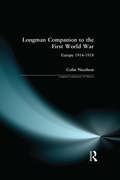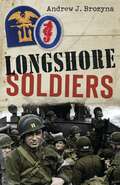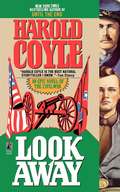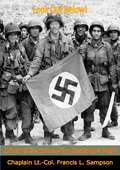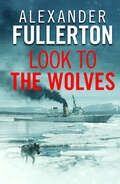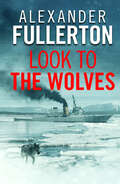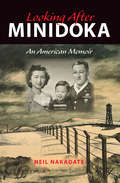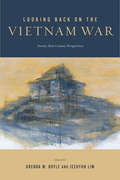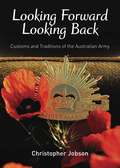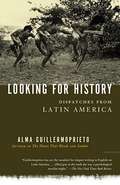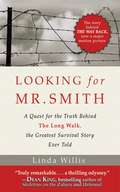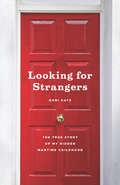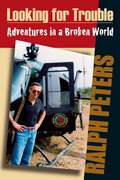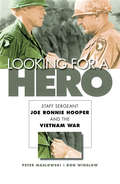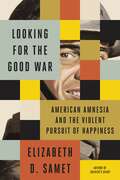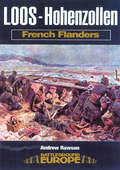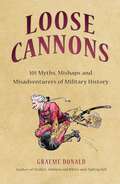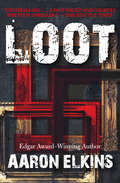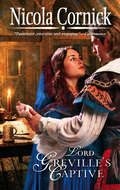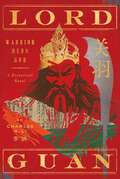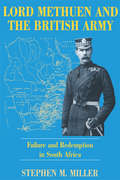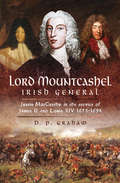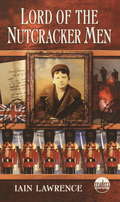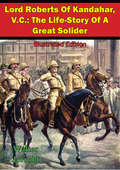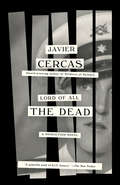- Table View
- List View
Longman Companion to the First World War: Europe 1914-1918 (Longman Companions To History)
by Colin NicolsonThis new Companion covers one of the most devastating conflicts in modern history. The Great War traumatised a generation and shaped the whole of the twentieth century. Speaking as loudly as any first-hand account, the facts and figures laid out in this volume reveal the sheer massive destruction caused by the war. Covering all aspects of the conflict from its origins and course to the peace settlements and the crises they generated, Colin Nicolson unravels historical controversies and also considers the social, cultural and economic consequences of the war for the whole of Europe. Containing all the essential facts and figures this Companion will be greatly welcomed by teachers, academics and students alike.
Longshore Soldiers
by Andrew BrozynaLongshore Soldiers chronicles the wartime experiences of port battalion veterans, part of the US Army's Transportation Corps, responsible for ensuring military were delivered to the front line. The author, Andrew Brozyna, traces the stories of the veterans from training in the US, to supplying the beaches of Normandy, dock work in Antwerp, supply for the British at El Alamein and finally to deactivation. Longshore Soldiers offers a compelling narrative, packed with first-hand accounts and personal histories, of an overlooked aspect of the Second World War. The author examines the logistics of the European theatre and how these veterans kept the Allied armies moving as they marched into the Reich.
Look Away: A History of the Confederate States of America
by Harold CoyleThis Civil War saga from military novelist Coyle is about two brothers from New Jersey who find themselves on opposite sides of the war.
Look Out Below!: A Story of the Airborne by a Paratrooper Padre
by Chaplain Lt.-Col. Francis L. SampsonFirst published in 1958, this book tells the spellbinding story of “one of the remarkable priests of God who leaped behind enemy lines and into the midst of combat with no weapon other than the sword of the spirit, no protection other than the shield of faith.“Here is the story of the airborne troopers told by the one who knew them best and with insights only a priest could possess.“It is sometimes humorous, sometimes tragic, often heroic, but always honest and inspiring as seen through the understanding and sympathetic eyes of the paratrooper padre.” (Lt.-Gen. Thomas F. Hickey)Richly illustrated throughout with photos.
Look to the Wolves (Russian Battles)
by Alexander FullertonCan Bob Cowan survive the icy killing fields of the Russian Civil War?It is 1919, and Bob Cowan – Lieutenant Commander, RNR – is serving with the Royal Navy in the Black Sea.A fluent Russian-speaker, he has been tasked to rescue two young British girls caught up in the Russian Civil War, working as nurses with the White Army.News of defeat at the Front reaches Cowan, but the importance of his mission is unchanged; he must push on – into the snowbound killing fields…Exciting, fast-paced and with meticulous historical research, Look to the Wolves is a masterpiece of action which will appeal to fans of Douglas Reeman and Philip McCutchan.
Look to the Wolves (The Russian Battles)
by Alexander FullertonCan Bob Cowan survive the icy killing fields of the Russian Civil War?It is 1919, and Bob Cowan – Lieutenant Commander, RNR – is serving with the Royal Navy in the Black Sea. A fluent Russian-speaker, he has been tasked to rescue two young British girls caught up in the Russian Civil War, working as nurses with the White Army. News of defeat at the Front reaches Cowan, but the importance of his mission is unchanged; he must push on – into the snowbound killing fields…Exciting, fast-paced and with meticulous historical research, Look to the Wolves is a masterpiece of action which will appeal to fans of Douglas Reeman and Philip McCutchan.
Looking After Minidoka: An American Memoir (Break Away Bks.)
by Neil NakadateA &“clear-eyed, carefully researched but nonetheless passionate book&” that is &“rich with the closely observed details of internment camp life&” (Lauren Kessler, author of Stubborn Twig: Three Generations in the Life of a Japanese American Family). During World War II, 110,000 Japanese Americans were removed from their homes and incarcerated by the US government. In Looking After Minidoka, the &“internment camp&” years become a prism for understanding three generations of Japanese-American life, from immigration to the end of the twentieth century. Nakadate blends history, poetry, rescued memory, and family stories in an American narrative of hope and disappointment, language and education, employment and social standing, prejudice and pain, communal values and personal dreams. &“Poetic yet sharply honest, the family story unfolds within the larger context of the national saga. You&’ll wince but read it anyway. Your soul will be better for it.&” —Nuvo &“This book is highly readable and contains fascinating details not usually covered in other books on Japanese-American history.&” —Oregon Historical Quarterly
Looking Back on the Vietnam War: Twenty-first-Century Perspectives
by Robert Mason Heonik Kwon Leonie Jones Viet Thanh Nguyen Cathy J. Schlund-Vials Vinh Nguyen Jeehyun Lim Professor Yen Le Espiritu Brenda M. Boyle Diane Niblack Fox Lan Duong Quan Tue TranMore than forty years have passed since the official end of the Vietnam War, yet the war's legacies endure. Its history and iconography still provide fodder for film and fiction, communities of war refugees have spawned a wide Vietnamese diaspora, and the United States military remains embroiled in unwinnable wars with eerie echoes of Vietnam. Looking Back on the Vietnam War brings together scholars from a broad variety of disciplines, who offer fresh insights on the war's psychological, economic, artistic, political, and environmental impacts. Each essay examines a different facet of the war, from its representation in Marvel comic books to the experiences of Vietnamese soldiers exposed to Agent Orange. By putting these pieces together, the contributors assemble an expansive yet nuanced composite portrait of the war and its global legacies. Though they come from diverse scholarly backgrounds, ranging from anthropology to film studies, the contributors are united in their commitment to original research. Whether exploring rare archives or engaging in extensive interviews, they voice perspectives that have been excluded from standard historical accounts. Looking Back on the Vietnam War thus embarks on an interdisciplinary and international investigation to discover what we remember about the war, how we remember it, and why.
Looking Forward Looking Back: Customs and Traditions of the Australian Army (Big Sky Publishing Ser.)
by Christopher JobsonLooking Forward, Looking Back explores the Australian Army's rich and proud history. The Australian Army boasts a broad variety of traditions, some of which belong to the Service as a whole, others to a particular corps, regiment or rank. Some are solemn, some are humorous, and others incorporate the rules of social etiquette, manners and style. Many of the Army's customs and traditions are derived from the battle tactics and fighting attire of old. Some of the drill movements seen on today's parade grounds were originally practised by soldiers in battle.
Looking for History: Dispatches from Latin America
by Alma GuillermoprietoOnly Alma Guillermoprieto, the most highly regarded writer on the region, could unravel the complex threads of Colombia's cocaine wars or assess the combination of despotism, charm, and political jiu-jitsu that has kept Fidel Castro in power for more than 40 years. And no one else can write with such acumen and sympathy about statesmen and campesinos, leftist revolutionaries and right-wing militias, and political figures from Evita Peron to Mexico's irrepressible president, Vicente Fox. Whether she is following the historic papal visit to Havana or staying awake for a pre-dawn interview with an insomniac Subcomandante Marcos, Guillermoprieto displays both the passion and knowledge of an insider and the perspective of a seasoned analyst. Looking for History is journalism in the finest traditions of Joan Didion, V. S. Naipaul, and Ryszard Kapucinski: observant, empathetic, and beautifully written.
Looking for Mr. Smith
by Linda WillisSince 1956, The Long Walk has been, for many, the symbol of an immense love of freedom and has become one of the greatest true-life adventure stories of all time. The harrowing story about a group of POWs who escaped a labor camp in Siberia and walked to freedom in India during WWII deeply affected thousands of its readers, and Linda Willis was one of those moved by the story. But she had questions about its authenticity: Was it all true? What happened after their arrival in India? Were there others involved in the story? Who was Mr. Smith? Though she was not a trained researcher, Willis felt compelled to look at some of the most powerful aspects of the story and to try to dig to the core of the truth behind The Long Walk. Willis's investigation took her down unforeseen byways with many hours spent unraveling facts, truths, half-truths, rumors, and the like. She waded through archives, wrote and spoke to hundreds of people, and continued to seek out and verify the details of the greatest adventure narrative ever written. The path of Willis's research will be a model for anyone attempting a similar search and who has ever thought about the story behind a book. No one who reads Looking for Mr. Smith will ever think of The Long Walk in the same way.
Looking for Strangers: The True Story of My Hidden Wartime Childhood
by Dori KatzDori Katz is a Jewish Holocaust survivor who thought that her lost memories of her childhood years in Belgium were irrecoverable. But after a chance viewing of a documentary about hidden children in German-occupied Belgium, she realized that she might, in fact, be able to unearth those years. Looking for Strangers is the deeply honest record of her attempt to do so, a detective story that unfolds through one of the most horrifying periods in history in an attempt to understand one’s place within it.In alternating chapters, Katz journeys into multiple pasts, setting details from her mother’s stories that have captivated her throughout her life alongside an account of her own return to Belgium forty years later—against her mother’s urgings—in search of greater clarity. She reconnects her sharp but fragmented memories: being sent by her mother in 1943, at the age of three, to live with a Catholic family under a Christian identity; then being given up, inexplicably, to an orphanage in the years immediately following the war. Only after that, amid postwar confusion, was she able to reconnect with her mother. Following this trail through Belgium to her past places of hiding, Katz eventually finds herself in San Francisco, speaking with a man who claimed to have known her father in Auschwitz—and thus known his end. Weighing many other stories from the people she meets along her way—all of whom seem to hold something back—she attempts to stitch thread after thread into a unified truth, to understand the countless motivations and circumstances that determined her remarkable life.A story at once about self-discovery, the transformation of memory, a fraught mother-daughter relationship, and the oppression of millions, Looking for Strangers is a book of both historical insight and imaginative grasp. It is a book in which the past, through its very mystery, becomes alive, immediate—of the most urgent importance.
Looking for Trouble
by Ralph PetersRalph Peters--career soldier, controversial strategist, prize-winning, best-selling novelist, erstwhile rock musician, popular columnist, and old-fashioned adventurer--has always been good for a surprise. Now, for the first time, Peters recounts the personal experiences that shaped his views of the world, from the collapsing Soviet Union to the drug wars of the Andean Ridge, from quiet forays into Burma and Laos to military missions to Pakistan and the Caucasus--and on to the Southwest border of the United States and the meanest streets of Los Angeles. As the U.S. Army's chosen troubleshooter before he took off his uniform to write, Peters saw the greatest international dramas of our times and the personal tragedies they created from a truly unique perspective--and took advantage of every moment "outside of the wire." The result is startling: the liveliest adventure memoir by an American in decades, a perfect balance of high drama and laugh-out-loud hilarity. Readers--among them his many devoted fans--will meet a faded beauty and former favorite singer of Josef Stalin's, now in her nineties and still a hopeless coquette; KGB officers who refuse to let go of the past in Moscow's back streets; a winsome princess adrift in a dying world; the corrupt Thai police general whose hobby was imitating Elvis to karaoke machines in rural bordellos; sentimental Caucasian gangsters; oblivious diplomats; wary Burmese colonels; doomed Mexican drug cops; Mennonite marijuana farmers; lonesome Nazi widows in Bolivia--and their Jewish friends; Muslim fundamentalists who write love poetry to imagined sweethearts . . . and, above all, the author's two loyal brothers-in-arms who sometimes shared the dangers and the wonder at the "back of beyond" and whose remarkable personal backgrounds, dashingly eccentric personalities, and appetite for adventure explode every cliché about military officers. Beautifully written and hauntingly told, Looking for Trouble is simply the book Ralph Peters was born to write. We can all be glad that he came back alive to write it.
Looking for a Hero: Staff Sergeant Joe Ronnie Hooper and the Vietnam War
by Don Winslow Peter MaslowskiWidely acclaimed as the Vietnam War's most highly decorated soldier, Joe Ronnie Hooper in many ways serves as a symbol for that conflict. His troubled, tempestuous life paralleled the upheavals in American society during the 1960s and 1970s, and his desperate quest to prove his manhood was uncomfortably akin to the macho image projected by three successive presidents in their "tough" policy in Southeast Asia. Looking for a Hero extracts the real Joe Hooper from the welter of lies and myths that swirl around his story; in doing so, the book uncovers not only the complicated truth about an American hero but also the story of how Hooper's war was lost in Vietnam, not at home. Extensive interviews with friends, fellow soldiers, and family members reveal Hooper as a complex, gifted, and disturbed man. They also expose the flaws in his most famous and treasured accomplishment: earning the Medal of Honor. In the distortions, half-truths, and outright lies that mar Hooper's medal of honor file, authors Peter Maslowski and Don Winslow find a painful reflection of the army's inability to be honest with itself and the American public, with all the dire consequences that this dishonesty ultimately entailed. In the inextricably linked stories of Hooper and the Vietnam War, the nature of that deceit, and of America's defeat, becomes clear.
Looking for the Good War: American Amnesia and the Violent Pursuit of Happiness
by Elizabeth D. Samet"Essential reading. This eloquent, far-ranging analysis of the national psyche goes as far as any book I've ever read toward explaining the peculiar American yen for war and more war." —Ben Fountain, author of Billy Lynn's Long Halftime Walk and Beautiful Country Burn AgainIn Looking for the Good War, Elizabeth D. Samet reexamines the literature, art, and culture that emerged after World War II, bringing her expertise as a professor of English at West Point to bear on the complexity of the postwar period in national life. She exposes the confusion about American identity that was expressed during and immediately after the war, and the deep national ambivalence toward war, violence, and veterans—all of which were suppressed in subsequent decades by a dangerously sentimental attitude toward the United States’ “exceptional” history and destiny. Samet finds the war's ambivalent legacy in some of its most heavily mythologized figures: the war correspondent epitomized by Ernie Pyle, the character of the erstwhile G.I. turned either cop or criminal in the pulp fiction and feature films of the late 1940s, the disaffected Civil War veteran who looms so large on the screen in the Cold War Western, and the resurgent military hero of the post-Vietnam period. Taken together, these figures reveal key elements of postwar attitudes toward violence, liberty, and nation—attitudes that have shaped domestic and foreign policy and that respond in various ways to various assumptions about national identity and purpose established or affirmed by World War II.As the United States reassesses its roles in Afghanistan and the Middle East, the time has come to rethink our national mythology: the way that World War II shaped our sense of national destiny, our beliefs about the use of American military force throughout the world, and our inability to accept the realities of the twenty-first century’s decades of devastating conflict.
Loos: French Flanders (Battleground Europe)
by Andrew RawsonIn September 1915 Kitcherner's men were in action for the first time in the largest offensive of the year. Using gas, British troops managed to open a three mile gap in the German line. However, misuse of the reserves allowed the chance of success to pass by. In the following struggle for Hohenzollern Redboubt, the British were defeated time after time by superior weapons and tactics. For the first time visitors will be able to explore this key battle, a battle that cost the BEF over 50,000 casualties.
Loose Cannons: 101 Things They Never Told You About Military History
by Graeme DonaldFrom the author of Sticklers, Sideburns, and Bikinis comes this funny, often irreverent look at two thousand years of lies, inaccuracies, propaganda, deceit, downright foolishness, and little-known facts from the ars militaria. On Hitler: "[No one] ever produced 'proof' of Hitler having won the Iron Cross, Second Class without which the First Class could not be awarded. He was a liar, but his favorite WWI yarn, about his life being spared by a British soldier who had him dead in his sights, is unfortunately true. It seems we have Private Henry Tandy VC, then of the Green Howards, to thank for all the fun of Round 2 with Germany." On Che Guevara: "The darling of week-end rebels and champagne socialists, Guevara continues to be lauded by the intellectually bankrupt who sport his image on T-shirts, making Guevara the only racist, mass murderer to become a fashion-accessory. He neither lived nor died a hero and almost everything trumpeted about him is false." On the Lusitania: She was not an American liner; she was not sunk on her maiden voyage; she was not an 'innocent' sunk without warning by the nasty Germans; the incident was not responsible for America's entry into WW1, and as for British connivance into her sinking, the jury is still out on that. On breast enhancement surgery: One of the more unusual 'developments' from WWII, to say the least, but modern breast enhancement techniques were a direct result of the American occupation of post-war Japan.
Loot
by Aaron ElkinsIn April 1945, The Nazis, reeling and near defeat, frantically work to hide the huge store of art treasures that Hitler has looted from Europe. Truck convoys loaded with the cultural wealth of the Western world pour in an unending stream into the compound of the vast Altaussee salt mine high in the Austrian Alps. But with the Allies closing in, the vaunted efficiency of the Nazis has broken down. At Altaussee, all is tumult and confusion. In the commotion a single truck, its driver, and its priceless load of masterpieces vanish into a mountain snowstorm.Half-a-century later, in a seedy Boston pawnshop, ex-curator Ben Revere makes a stunning discovery among the piles of junk: a Velazquez from the legendary Lost Truck. But with it come decades of secrets, rancor, and lies, and the few who know of the painting's existence have their lives snuffed out one by one by an unknown assassin. Revere must travel back to the grand cities of Europe to unravel the tangled history of the lost truck and its treasures before fifty years of hatred, greed, and retribution catch up with him.
Lord Greville's Captive
by Nicola CornickThe English Civil War tests the bonds between a lord and lady engaged to be married in this historical romance.Years before, he had come to Grafton Manor to be betrothed to the innocent and beautiful Lady Anne—a promise that was broken with the onset of war. . . .Now Simon, Lord Greville, has returned as an enemy, besieging the manor and holding its lady hostage. Simon’s devotion to his cause swayed by his desire for Anne, he will not settle for the manor house alone. He will have the lady—and her heart—into the bargain!Yet Anne has a secret that must be kept from him at all costs. . . .
Lord Guan
by Charles N. LiFor fans of SHOGUN (and from the publisher of the bestseller WICKED by Gregory Maguire) comes another iconic story inspired by a real-life world-famous hero, LORD GUAN, the honorable warrior who tried to restore the Han dynasty in second-century China. His military maneuvers, warrior brotherhood, and an unexpected romance with a brilliant escaped concubine have inspired millions of people for generations. Lord Guan (also known as Guan-Yu) has been the subject of television, films, operas, and video games worldwide. Dozens of temples have been built to pay homage to him worldwide. He is known as the God of Good Fortune and also represents honor, courage and loyalty. This historical tale is now fully imagined in a dramatic and modern retelling and is being developed as a rap musical that will inspire readers of all generations for years to come.Guan Yu (160 - 220 A.D.), also known as Guan Gong (Lord Guan), has been celebrated as a pan-Asiatic hero for well over a thousand years. He has been repeatedly canonized and deified across Asia. This historically detailed novel tells the story of his humble beginnings in a rural setting, his unexpected journey into martial arts, the murder of his family members, his unexpected love story, and his emergence as an invincible warrior. It follows his dedication to restoring the great Han Dynasty (206 B.C. - 220 A.D.) during a tumultuous and war-torn period in Chinese history. At the outset of his mission, he forms a brotherhood with two equally idealistic supporters of the Han Dynasty. Together, the three men, known as the Peach Garden Brothers, become the backbone of a military force competing against warlords for control of the declining Han Empire. Throughout the years of conflict, Lord Guan encounters Xian-Hui, a talented and educated beauty kidnapped by eunuchs from the Imperial Palace who is forced to serve as a concubine. With great courage, she escapes her bondage and unexpectedly meets Lord Guan during her frightening getaway. Lord Guan ultimately sacrifices his life for his mission. Although he did not succeed in restoring the Han Dynasty, his legendary exploits have become an integral part of Chinese folklore. He has endured in the hearts and minds of millions throughout history as a symbol of courage, integrity, and loyalty. This novel dramatically retells this enchanting true-life story, enriched with informative historical details. Lord Guan's adventures were first romanticized in the classic epic of Chinese literature, the 14th-century novel "The Romance of the Three Kingdoms." Charles Li's "Lord Guan" is a modern and dramatic retelling of this historically significant tale. Lord Guan's character has been commemorated through the centuries in thousands of shrines across Asia and in various media, including opera, film, art, literature, and video games. This novel highlights his journey and tells the story of the making of a timeless hero who symbolizes courage, honor, loyalty and integrity—values that will have broad appeal to readers of all ages during this challenging time.
Lord Methuen and the British Army: Failure and Redemption in South Africa
by Stephen M. MillerThis study analyzes the readiness of the British military establishment for war in 1899 and its performance in the South African War (1899-1902). It focuses on the career of Field Marshal Paul Sanford, 3rd Baron Methuen, whose traditional military training, used so effectively in Queen Victoria's small wars, was put to the test by the modern challenges of the South African War. A subsidiary aim of this work is to correct and refine the historical consensus that Methuen's campaing in the South African War was plagued by practical errors and poor judgement. The South African War was a crucial transitional episode in the history of the British army. Unlike Great Britain's other expeditions, it required the concentrated resources of the entire empire. It was a modern war in the sense that it employed the technology, the weaponry, the communications, and the transportation of the second industrial revolution.
Lord Mountcashel: Justin MacCarthy in the Service of James II and Louis XIV, 1673–1694
by D. P. GrahamJustin MacCarthy (later Lord Mountcashel) was born into a notable family of Irish Jacobites, loyal to the exiled Stuarts, and grew up in France. Their Irish land was regained after the Restoration of Charles II but Justin, as the youngest surviving son, sought a career in the French army (as both his father and oldest brother had done). In 1673 he joined an Irish regiment in French service. He served under the legendary French marshals Turenne and Conde against the Dutch and their Imperial allies and by 1676 was commanding the regiment. He became part of the personal circle of the Catholic Duke of York, the future James II and, after the latters accession in 1685, Justin helped to transform the Irish army into a Catholic one.When James II was deposed in the Glorious Revolution of 1688 and fled via France to Ireland, Justin was one of the most experienced commanders resisting Williams invasion. Unfortunately MacCarthy was defeated at the Battle of Newtownbutler (1689), wounded and captured. He escaped and again went into exile in France, where he was the first commander of the famous Irish Brigade until his death in 1694.
Lord Of The Nutcracker Men
by Iain LawrenceTen-year-old Johnny eagerly plays at war with the army of nutcracker soldiers his toymaker father whittles for him. He demolishes imaginary foes. But in 1914 Germany looms as the real enemy of Europe, and all too soon Johnny’s father is swept up in the war to end all wars. He proudly enlists with his British countrymen to fight at the front in France. The war, though, is nothing like what any soldier or person at home expected. The letters that arrive from Johnny’s dad reveal the ugly realities of combat — and the soldiers he carves and encloses begin to bear its scars. Still, Johnny adds these soldiers to his armies of Huns, Tommies, and Frenchmen, engaging them in furious fights. But when these games seem to foretell his dad’s real battles, Johnny thinks he possesses godlike powers over his wooden men. He fears he controls his father’s fate, the lives of all the soldiers in no-man’s land, and the outcome of the war itself. From the Hardcover edition.
Lord Roberts Of Kandahar, V.C.: The Life-Story Of A Great Solider [Illustrated Edition]
by Walter JerroldIncludes 9 illustrations"As a leader of men in the field he is, I believe, without equal." -- Sir Alfred Milner on Lord RobertsIn this excellent short biography of Lord Roberts, Walter Jerrold, tells the tale of his many exploits and victories across the British Empire."Roberts won the Victoria Cross at Khudagani during the Indian Mutiny (1857-59) for repeated acts of gallantry, but first came to public notice during the Second Afghan War (1878-80) when he commanded the Kurram Field Force, leading it to victory at Peiwar Kotal in December 1878, and later the Kabul Field Force which occupied the Afghan capital in October 1879 following the murder of the British envoy."Roberts also led his troops on the legendary march from Kabul to Kandahar. Despite the difficult terrain and the high temperatures he covered 280 miles (400km) in 20 days and hardly lost a man. In September 1880 he defeated Ayub Khan outside Kandahar and relieved the besieged garrison. "After the early reverses of the Boer War (1899-1902), Roberts took over command of the British forces in South Africa. From December 1899, together with his Chief of Staff Major-General Horatio Herbert, Lord Kitchener, he revitalised the British military effort. Kindly, unassuming and courteous, Roberts was popularly known as 'Bobs'. His small stature and elderly appearance - he was 68 when he left South Africa in 1900 - probably increased the veneration which he received from both the public and soldiers."On returning to Britain he was made a Knight of the Garter and created Earl Roberts. Despite a bitter rivalry with the Wolseley ring, Roberts was made the last Commander-in-Chief of the British Army, a position he held for three years until 1904.After lying in state in Westminster Hall, one of only two non-Royals to do so in the 20th century, the other being Winston Churchill, he was given a state funeral."--NAM
Lord of All the Dead: A nonfiction novel
by Javier CercasFrom the internationally renowned author of The Impostor, a courageous journey into his own family history and that of a country collapsing from a fratricidal war--his most moving, most personal book, one he has spent his entire life preparing to write.Javier Cercas grew up hearing the legend of his adored great-uncle Manuel Mena, who died at nineteen in the bloodiest battle of the Spanish Civil War--while fighting for Franco's army. Who was this young man? A fascist hero whose memory is an embarrassment or a committed idealist who happened to fall on the wrong side of history? Is it possible to be a moral person defending an immoral cause? Through visits back to his parents' village in southern Spain, interviews with survivors, and research into the murkiest corners of the war, the author pieces together the life of this enigmatic figure and of an entire generation. This sui generis work combines intimate family history, investigative scholarship, personal confession, war stories, and road trips, finally becoming a transcendent portrait of a country's indelible scars--a book about heroism, death, the persistence of the past, and the meaning of an individual life against the tapestry of history.
